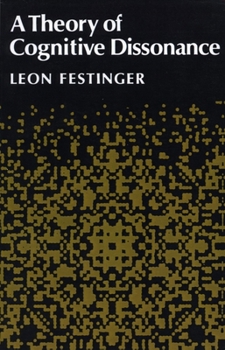A Theory of Cognitive Dissonance
Select Format
Select Condition 
Book Overview
Leon Festinger's theory of cognitive dissonance has been widely recognized for its important and influential concepts in areas of motivation and social psychology. The theory of dissonance is here applied to the problem of why partial reward, delay of reward, and effort expenditure during training result in increased resistance to extinction. The author contends that a state of impasse exists within learning theory largely because some of...
Format:Paperback
Language:English
ISBN:0804709114
ISBN13:9780804709118
Release Date:January 1957
Publisher:Stanford University Press
Length:291 Pages
Weight:1.15 lbs.
Dimensions:0.9" x 5.4" x 8.4"
Customer Reviews
2 ratings
Enormous Explanatory Power Regarding Human Behavior
Published by Thriftbooks.com User , 15 years ago
Still (as of May, 2009) one of my few favorite psychology treatises of all time, A Theory of Cognitive Dissonance best exemplified the pivotal concept of, and was a key bibliographic source for, my 1972 Georgetown Univ. doctoral dissertation topic (the title itself was longer, applied to specific subjects), "Cognitive Consistency and Interpersonal Conflict." I'm revisiting this subject today because just two days ago a local professional psychologist I met at the gym described Festinger's book as "maybe the highest overall explanatory power regarding human behavior of anything I've ever read." The gist of Festinger's theory, distilled from his ample research and experience, is that there is systemic pressure toward organic consistency (the opposite of dissonance) among each person's percepts, concepts, overall sociological interactions and worldview tendencies, and that new information felt to be inconsistent with those is strongly resisted, often not understood or even clearly perceived because this new info is dissonant, i.e. cacophonous, with the person's already incorporated data/feelings/beliefs. Since 1972 I've found nothing to disconfirm Festinger's theory, and dozens of elements to confirm it. One recent excellent lay presentation, the cover article of New Scientist magazine of about a year ago, "Two Tribes," summarizes two genetically distinct brain types that greatly differ, for example, in a standard cognitive measurement known as "tolerance of ambiguity." The article, directed mainly toward Americans, presented tested data demonstrating that, in general, individuals of higher tolerance of ambiguity were more frequently found among Democrats, and those of lower tolerance more often among Republicans. Individuals of lower ambiguity tolerance find it harder to incorporate new info and reassess/rearrange prior info, because they experience more physical/mental stress during periods of shades-of-gray ambiguity; their brain more quickly pulls together data perceived as consistent with prior beliefs and more quickly excludes/rejects anything dissonant with it. (As a prime example of low ambiguity tolerance, think of GW Bush, who often called himself "the decider.") States of indecision are much more painful for the low-tolerance type, who then hold tighter to whatever opinions they form, even in the face of clearly disconfirming/falsifying information. As illustrative of this powerfully confirmed theory, Festinger also wrote When Prophecy Fails, the true description of how a group of religious believers in a contemporary end-of-world prophet reacted when the prophet's specifically promised world-end prediction glaringly failed on the guaranteed date. Rather than sensibly seeing the failure as dissonant proof of a false prophet, his believers rationalized the non-end in a way consistent with their preferred belief structure. His book Theory of Cognitive Dissonance explains how this psychology operates as the result of organic brain fu
For us all
Published by Thriftbooks.com User , 24 years ago
In Theory of Cognitive Disonance, Festinger has written a book we can all easily follow along and indeed find hard to put down. The book is not cold and technical like so many other books in this field, on the contrary, it's quite engaging.His theory, which has been referenced in media often, is thouroughly interesting. It describes the means by which one's mind tries to maintain consistency between one's attitudes, behaviours, and beliefs. The examples set forth are both funny and intriguing.A book you will thoroughly enjoy while learning a great deal about the functionings of your own mind.





